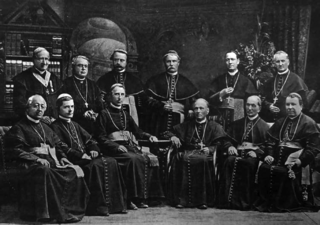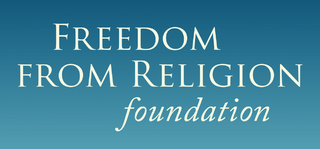Related Research Articles

Clergy are formal leaders within established religions. Their roles and functions vary in different religious traditions, but usually involve presiding over specific rituals and teaching their religion's doctrines and practices. Some of the terms used for individual clergy are clergyman, clergywoman, clergyperson, churchman, ecclesiastic, and cleric, while clerk in holy orders has a long history but is rarely used.
A rabbi is a spiritual leader or religious teacher in Judaism. One becomes a rabbi by being ordained by another rabbi—known as semikha—following a course of study of Jewish history and texts such as the Talmud. The basic form of the rabbi developed in the Pharisaic and Talmudic eras, when learned teachers assembled to codify Judaism's written and oral laws. The title "rabbi" was first used in the first century CE. In more recent centuries, the duties of a rabbi became increasingly influenced by the duties of the Protestant Christian minister, hence the title "pulpit rabbis", and in 19th-century Germany and the United States rabbinic activities including sermons, pastoral counseling, and representing the community to the outside, all increased in importance.

The Freedom From Religion Foundation (FFRF) is an American nonprofit organization that advocates for atheists, agnostics, and nontheists. Formed in 1976, FFRF promotes the separation of church and state, and challenges the legitimacy of many federal and state programs that are faith-based. It supports groups such as nonreligious students and clergy who want to leave their faith.

A clergy house is the residence, or former residence, of one or more priests or ministers of religion. Residences of this type can have a variety of names, such as manse, parsonage, rectory or vicarage.
The Canada Revenue Agency is the revenue service of the Canadian federal government, and most provincial and territorial governments. The CRA collects taxes, administers tax law and policy, and delivers benefit programs and tax credits. Legislation administered by the CRA includes the Income Tax Act, parts of the Excise Tax Act, and parts of laws relating to the Canada Pension Plan, employment insurance (EI), tariffs and duties. The agency also oversees the registration of charities in Canada, and enforces much of the country's tax laws.
A 501(c) organization is a nonprofit organization in the federal law of the United States according to Internal Revenue Code and is one of over 29 types of nonprofit organizations exempt from some federal income taxes. Sections 503 through 505 set out the requirements for obtaining such exemptions. Many states refer to Section 501(c) for definitions of organizations exempt from state taxation as well. 501(c) organizations can receive unlimited contributions from individuals, corporations, and unions.
A church tax is a tax collected by the state from members of some religious denominations to provide financial support of churches, such as the salaries of its clergy and to pay the operating cost of the church. Not all countries have such a tax. In some countries that do, people who are not members of a religious community are exempt from the tax; in others it is always levied, with the payer often entitled to choose who receives it, typically the state or an activity of social interest.
McCollum v. Board of Education, 333 U.S. 203 (1948), was a landmark United States Supreme Court case related to the power of a state to use its tax-supported public school system to aid religious instruction. The case was a test of the separation of church and state with respect to education.
A 501(c)(3) organization is a United States corporation, trust, unincorporated association or other type of organization exempt from federal income tax under section 501(c)(3) of Title 26 of the United States Code. It is one of the 29 types of 501(c) nonprofit organizations in the US.
Hein v. Freedom From Religion Foundation, 551 U.S. 587 (2007), was a decision by the United States Supreme Court which ruled that taxpayers do not have the right to challenge the constitutionality of expenditures by the executive branch of the government. The issue was whether taxpayers have the right to challenge the existence of the White House Office of Faith-Based and Community Initiatives. The case centered on three Supreme Court precedents: Flast v. Cohen, Bowen v. Kendrick, and Valley Forge Christian College v. Americans United for Separation of Church & State.

Scientology status by country describes the status of Scientology and its recognition as a religion in varying contexts or in different countries. The Church of Scientology pursues an extensive public relations campaign for state recognition of Scientology as a religion.
As of 2023, Russia is a majority Russian Orthodox society, with significant minority religions within its borders protected by the Constitution of Russia.
Barbara Brandriff Crabb is a senior United States district judge of the United States District Court for the Western District of Wisconsin.
Tax protesters in the United States advance a number of constitutional arguments asserting that the imposition, assessment and collection of the federal income tax violates the United States Constitution. These kinds of arguments, though related to, are distinguished from statutory and administrative arguments, which presuppose the constitutionality of the income tax, as well as from general conspiracy arguments, which are based upon the proposition that the three branches of the federal government are involved together in a deliberate, on-going campaign of deception for the purpose of defrauding individuals or entities of their wealth or profits. Although constitutional challenges to U.S. tax laws are frequently directed towards the validity and effect of the Sixteenth Amendment, assertions that the income tax violates various other provisions of the Constitution have been made as well.
The government of the Soviet Union followed an unofficial policy of state atheism, aiming to gradually eliminate religious belief within its borders. While it never officially made religion illegal, the state nevertheless made great efforts to reduce the prevalence of religious belief within society. To this end, at various times in its history it engaged in anti-religious persecutions of varying intensity and methodology. Believers were never officially attacked for being believers, but they were officially attacked for real or perceived political opposition to the state and to its policies. These attacks, however, in the broader ideological context were ultimately meant to serve the ultimate goal of eliminating religion, and the perceived political opposition acted as a legal pretext to carry this out. Thus, although the Soviet Union was officially a secular state and guaranteed freedom of religion in its constitutions, in practice believers suffered discrimination and were widely attacked for promoting religion.
East Meadow Beth-El Jewish Center (EMJC) is a Conservative Jewish synagogue located in East Meadow, New York. Temple Beth-El of Bellmore, New York, consolidated with East Meadow Jewish Center to create East Meadow Beth-El Jewish Center. Rabbi Dr. Ronald L. Androphy has been the rabbi of the synagogue since 1983.

R v Registrar General ex parte Segerdal and another was a court case heard by the Court of Appeal of England and Wales, which was instrumental in determining whether the Church of Scientology was to be considered a bona fide religion in England and Wales, and by extension what defines a religion in English law. The case, heard in 1969–70, focused on the question of whether a chapel at the Scientologists' UK headquarters should be registered as a meeting place for religious worship under an 1855 law. The Church's initial application was refused and it appealed the case to the courts, arguing that Scientology was a genuine religion and that it used the chapel for religious purposes. In dismissing the appeal, the Court of Appeal found that Scientology's practices "did not reveal any form whatever of worship". Ten years later, the Segerdal ruling was drawn upon to define a religion for the purposes of English common law as requiring "faith in a god and worship of that god". The Segerdal ruling was later overturned by the Supreme Court in 2013 who redefined the term "religion" in a modern context and ruled that Scientology is to be recognised as a religion in the UK.

Yehoram Ulman is a rabbi in Sydney, Australia. He was born in Leningrad, USSR in 1964. He holds a number of senior positions in the Orthodox Jewish community.

The legal status of the Universal Life Church encompasses a collection of court decisions and state executive branch pronouncements determining what rights the Universal Life Church (ULC) and comparable organizations have as religious organizations.
Church of Atheism of Central Canada v Canada (National Revenue) 2019 FCA 296 (CanLII) is a 2019 Federal Court of Appeal case in Canada. It was brought by the Church of Atheism of Central Canada against the Canada Revenue Agency after the Minister of National Revenue rejected their application for religious charitable status. The court determined on a unanimous verdict that atheism is not a religion and not eligible for tax-exempt charity status.
References
- ↑ "Ministers' Compensation & Housing Allowance | Internal Revenue Service". www.irs.gov.
- 1 2 3 4 5 "Parsonage". Reform Pension Board.
- 1 2 3 4 5 "Here's why rabbis can keep their housing expenses tax free".
- 1 2 3 4 5 "U.S. Code § 107 - Rental value of parsonages". Internal Revenue Service. Legal Information Institute. Cornell University Law School. August 16, 1954. Amended on May 20, 2002. Accessed on March 29, 2016.
- 1 2 3 4 5 "Publication 15-A: Employer's Supplemental Tax Guide". Internal Revenue Service. 2016.
- 1 2 3 4 5 6 "Publication 517: Social Security and Other Information for Members of the Clergy and Religious Workers". Internal Revenue Service. 2015.
- ↑ Oster, Marcy. "US rabbis' housing expenses to remain tax free". www.timesofisrael.com.
- 1 2 "Treasury Regulation Section 1.107-1: Rental value of parsonages". Internal Revenue Service. Legal Information Institute. Cornell University Law School. Retrieved October 25, 2017.
- ↑ "Treasury Regulation Section 1.1402(c)-5: Ministers and members of religious orders". Internal Revenue Service. Legal Information Institute. Cornell University Law School. Retrieved October 25, 2017.
- ↑ Rev. Rul. 62-171, 1962-2 C.B.
- ↑ Rev. Rul. 72-606.
- ↑ Revenue Ruling 63-156, 1963-2 C.B. 79. Internal Revenue Service.
- ↑ Internal Revenue Service Rev. Rul. 63-156.
- ↑ Internal Revenue Service Rev. Rul. 72-249.
- ↑ Internal Revenue Service Private Letter Ruling 8404101 (1984).
- 1 2 3 "The Minister’s Housing Allowance". Evangelical Council for Financial Accountability . Retrieved December 24, 2017.
- ↑ Smilowitz, Mitchell J. (2023). "Understanding the Parsonage Allowance Part 2: Calculating the Parsonage Allowance". Joint Retirement Board for Conservative Judaism.
- 1 2 "Publication 1828: Tax Guide for Churches & Religious Organizations". Internal Revenue Service. 2015.
- ↑ "Freedom from Religion Foundation, Inc. v. Lew". United States Court of Appeals for the Seventh Circuit . No. 14–1152. November 13, 2014.
- 1 2 Bruinius, Harry. "Why a former minister is challenging churches' tax privileges in US". The Christian Science Monitor. October 20, 2017.
- ↑ "Gaylor, Barker, Gaylor, and Freedom from Religion Foundation v. Mnuchin and Koskinen". United States Court of Appeals for the Seventh Circuit . April 6, 2016.
- ↑ Reilly, Peter J. "Clergy Housing Tax Break Ruled Unconstitutional - Again". Forbes . October 7, 2017.
- ↑ "Gaylor, Barker, Gaylor, and Freedom from Religion Foundation v. Mnuchin and Koskinen". United States Court of Appeals for the Seventh Circuit . October 6, 2017.
- 1 2 3 Reilly, Peter J. "Tax Free Housing Benefits For Clergy Will Be Safe For The Present". Forbes . December 23, 2017.
- ↑ "Gaylor, Barker, Gaylor, and Freedom from Religion Foundation v. Mnuchin and Koskinen". United States Court of Appeals for the Seventh Circuit . December 13, 2017.
- 1 2 Bauer, Scott (March 15, 2019). "Federal appeals court OKs tax-free housing for clergy". The Washington Post.
- ↑ Banks, Adelle M. (March 19, 2019). "Clergy housing allowance is constitutional, appeals court rules". Religion News Service.